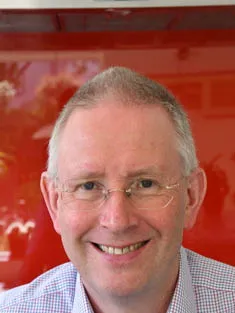Winner: 2020 Interdisciplinary Prize
Professor Chris Abell
University of Cambridge
For pioneering work on fragment-based drug discovery and microfluidic microdroplets.

Professor Abell’s interest in research is about taking simple ideas or concepts and developing them. This is illustrated by the two main themes of his research; using fragment-based approaches to design molecules and developing microdroplets as a platform technology.
Using fragment-based approaches, Professor Abell and his team identify a small molecule (a fragment) that binds to a protein, and use X-ray crystallography to see how it is binding. They then grow or elaborate that fragment using chemistry into progressively bigger molecules that bind more and more tightly to the protein. These molecules can be good starting points for the development of therapeutics.
In his microdroplet research, Professor Abell takes tiny water droplets and uses them as miniature reactors for chemical or biochemical reactions. This enables many millions of reactions to be studied in a very short space of time. The team have applied these ideas to very diverse areas of study including developing new materials, sequencing single cells and studying how algae grow.
Biography
Professor Chris Abell is the Pro-Vice-Chancellor for Research and the Professor of Biological Chemistry at the University of Cambridge. He was an undergraduate and graduate at Cambridge, where he did his PhD on polyketide biosynthesis with Jim Staunton. He then spent a postdoctoral year in the USA with Professor David Cane studying terpene enzymology, before returning to an academic post at Cambridge. In the mid-1980s he set up a molecular biology lab to clone enzymes involved in tetrapyrrole assembly. Thereafter he spent many years studying the mechanisms of enzymes on the shikimate and pantothenate pathways. In the late 1990s, Professor Abell became interested in nanotechnology and scanning probe microscopy, eventually leading to pioneering work on microdroplets as a novel experimental platform, and resulted in him co-founding Sphere Fluidics (2010) and Aqdot (2013).
Professor Abell’s main research focus is on using fragment-based methods in drug discovery and chemical biology, with a specific focus on tuberculosis and cystic fibrosis. In 1999, he co-founded Astex with Harren Jhoti and Sir Tom Blundell, which became the world-leading company in fragment-based drug discovery. Astex was acquired by Otsuka in 2013 and has already played a key role in the discovery of two anti-cancer drugs: Kisqali (2017) and Balversa (2019).
He has published over 330 papers and is an inventor on numerous patents. He was a founding director of Cambridge Enterprise and from 2013-2015 he was the first Director of Postdoctoral Affairs in the University. Professor Abell was elected into the Academy of Medical Sciences in 2012 and a Fellow of the Royal Society in 2016.
I am currently working as part of a team to set up a high throughput Covid testing centre in the university – an astonishing project, bringing together chemists, biologists, and virologists with experts in automation and IT.
Professor Chris Abell
Q&A with Professor Chris Abell
Who or what has inspired you?
Much of my inspiration came from colleagues who influenced my early thinking about research, especially Jim Staunton, David Cane, Sir Alan Battersby, Jeremy Sanders and Jeremy Knowles.
What has been a highlight for you?
There have been many highlights, but Astex getting a drug to market has to be one of them
Why do you think teamwork is important in science?
At present I am working as part of a team alongside scientists from Astra-Zeneca and Glaxo Smith Kline to set up a high throughput Covid testing centre in the university. This is an astonishing project, bringing together chemists, biologists, and virologists with experts in automation and IT. What we are achieving is exciting and important - and would be impossible without teamwork and trust.
Why do you think interdisciplinary research and collaboration is important in science?
I have wanted to answer specific questions or achieve specific goals, and to do that I have needed chemistry, biochemistry, molecular biology, structural biology, computational chemistry, material science, plant science, nanotechnology, the list goes on. My training in chemistry has given me the confidence and ability to do this.